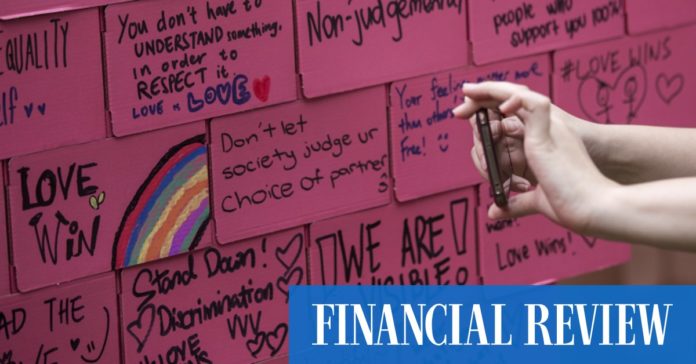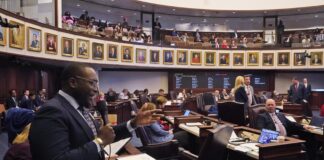
As it turned out, this will not be hard-wired into the Constitution. But there will be a legislative tweak to ensure the definition cannot be challenged on constitutional grounds.
The removal of what many describe as a “shameful law” that dates back to colonial times will improve Singapore’s chances in the global war for top talent.
It’s also a rare, revealing moment for a nation known more for efficiency than soul-searching and where pride in compliance is so knitted into the national identity that few taxi drivers can resist boasting about how safe the country is.
And it offers an insight into how change occurs when many – like John – who seek it do not identify as activists; who know they have to stick in their lane, observe what they describe as OB (out of bounds) markers, and carefully try to pull rather than push the centre along.
A ‘long, tiring fight’
For the past nine years, lawyer Remy Choo has been involved in legal challenges to Section 377a. When it comes to gay marriage, he says the community doesn’t want “to freak people out”.
“If you look at other jurisdictions, there has always been some breathing room between decriminalisation and next steps. We need to give everyone time to digest.”
Right now, Choo’s main emotion is relief. The vote to remove Section 377a will be along party lines, meaning the law is as good as gone. It’s the end of what Choo describes as “a long, tiring fight”.
“Each time we mounted a challenge, there’s been a huge mobilisation of resources. That built up expectations, and then came disappointment.
“So it’s a huge relief that it is finally out the door. I think it’s a testament of how far society has come. That’s what activism is all about – making what is extraordinary today unexceptional tomorrow”.
For Kathy Teo, an entrepreneur who runs her own digital marketing business, putting civil partnerships on the same legal footing as marriage is more of a priority than gay marriage.
“We’ve just achieved decriminalisation. No one in the LGBT activist community is talking about marriage equality right now. Before we get there, we’ve got to recognise civil unions and partnerships so all of those couples – hetero as well as gay – can enjoy the same benefits as married people.”
When you marry in Singapore, you can join the queue for a subsidised apartment. If you don’t marry, you have to wait until you’re 35. Marital status also affects the right to adopt, has some tax benefits, and extends to immigration rules.
‘It opens the door for us’
LGBT people are not asking for special rights, Teo points out. “We just want to be treated the same as other contributing members of society.”
Decriminalisation is the first step. “It opens the door for us to speak about how we can be treated more equally, and not as criminals or second-class citizens.”
The PAP has pointedly rebuffed any attempt by Western governments or corporations to influence the process. In 2017, it ruled that sponsorship of the annual gay rights event Pink Dot SG by multinationals amounted to foreign interference.
Last month, the Lee government responded to a call by US House Speaker Nancy Pelosi for businesses in Singapore to support the LGBT community with a tersely worded statement that reminded foreign companies “these are matters for Singaporeans to discuss”.
Teo, who has lived in the United States and Britain for extended periods, is one of the business sponsors of Pink Dot.
Rather than signing up a few big corporate sponsors, Pink Dot needs to sign more than 100 sponsors made up of businesses that are majority local owned or Singaporean citizens.
Teo agrees advocacy looks different in countries that are more used to public demonstrations. “The UK and US have fewer obstacles. There is freer speech in those countries. Here we have to be a bit more cautious about where and how we protest.”
‘Two single mothers’
Bryan Choong chairs Oogachaga, a Singapore group that works with the lesbian, gay, bisexual, transgender, questioning and queer (LGBTQ+) community. He says the obstacles are considerable, but there has been some improvement. “For the longest time, very few LGBTQ+ organisations were allowed to register legally,” he says.
“This hampered our ability to mobilise resources and raise funds. Only in the past few years, LGBTQ+ organisations delivering community services have been allowed to register. Advocacy organisations still face many restrictions.”
He points out that Singapore’s strict media policies mean if you don’t watch internet-based media, you are unlikely to see many LGBTQI+ characters portrayed.
“Due to such restricted information, most Singaporeans do not have good understanding of these issues. Most did not even know 377a existed until Sunday’s announcement. They often take social cues from the government on what is wrong, right or acceptable. After the repeal, we expect the mindset among general population will shift as well,” Choong says.
My hope is that with the repeal, those who are on the margins now will feel more comfortable being out.
— Shiyan Koh
Shiyan Koh, a private equity fund manager, and her wife, a technology professional, live in Singapore with their two children. Koh gave birth to their first child, now five, while the couple were living in the United States, so the child holds American and Singaporean passports.
Her partner, a US national, gave birth to their second child, now three, in Singapore. The couple’s marriage is not recognised in Singapore, so the three-year-old’s residence status is tied to his birth mother’s employment pass. Like his mother, the younger child has only one passport, an American one.
“My wife jokes that in the eyes of the Singaporean government, we are two single mothers who live at the same address and look after each other’s children,” Koh says. Clearly this view is not ideal – or accurate – but others are worse off.
Koh hopes there will be further adjustments down the track so that people don’t feel like they have to leave Singapore to have a family, or be with someone they love.
“My wife has an advanced skillset, so it was not too hard for her to get a job with an employment pass, but it’s much more challenging for people whose partners work in sectors where it is harder to get a work permit.”
The repeal of Section 337a is a huge thing, Koh says. “It is something we are grateful for. My hope is that with the repeal, those who are on the margins now will feel more comfortable being out.”
That will, in turn, increase the number of Singaporeans who “realise they know gay people – and it’s a lot harder to ‘other’ someone when you know someone”, Koh says.
The pace of change does need to be carefully balanced.
“This is delicate territory. We look at the culture wars of the West and no-one wants that. The question is, how do you treat people with dignity while trying to change assumptions that are ingrained?” Koh says.
“That’s something that we as a society have to navigate. Any perception that this is a Western idea that is being pushed by woke liberals – that’s not going to work.”








